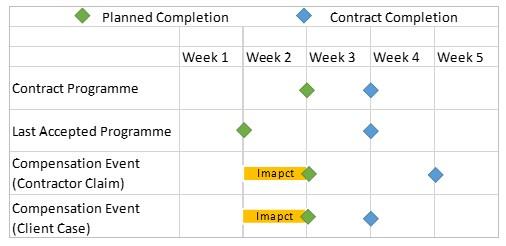Dear All Planning Planet Users,
I understand that the contractor own the Terminal Float and I understand that if there was a compensation event that impact the planned completion date, the contract completion date will be impacted by the same amount of time. but if the planned completion has been brought forward due to combination of efficient working and client giving access early etc, can the Terminal Float be extended?
We have a situation where-in the Planned Completion has been brought forward (ahead) and we are soon hit by a CE that almost consumes the time saved before. The contractor claims that they are entitled to a EOT and Target increase as their Terminal Float is now longer. My case in defence is that the planned completion is not going to any later than the original planned completion and so the Contract Completion should not be impacted. Can you please throw in your expertise to say if I have a contractually valid point to defend my case.
below is a rough illustration of the situation showing the original, last accepted, impact and what the client case of defence. Any input is greatly appreciated.
Many Thanks
Senthil







Replies